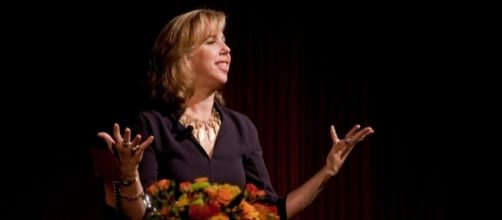Speaking with CNN's Brian Stelter on Reliable Sources this morning, managing editor at Time magazine Nancy Gibbs was asked about demonstrably false statements made by President Donald Trump and members of his administration. Time recently wrote that there is a "limit" to what writers can "deduce" with regard to the true intentions and beliefs of any speaker, including the president. The publication described "wrestling" with the correct choice of words with regard to reporting on lies.
Brian Stelter asked the Time editor about instances when the magazine had "decided to apply the word 'lie,' or not, to the president's claims." Ms.
Gibbs stated that the publication is "very careful" when reporting on the validity of claims made by individuals. She elaborated that the job of the media is to "say when any public figure has their facts wrong."
Difference between falsehood and intentional lie
The 57-year-old Time editor noted that to responsibly state that a person is lying requires a higher "level of knowledge" that is "difficult" to achieve. She continued that understanding the speaker's "intention" is paramount in understanding whether or not an intentional lie was told. Ms. Gibbs held up several seeming falsehoods perpetuated by President Trump, which, even after being challenged, he continues to appear to believe.
The editor asked, if someone "believes" a false statement they have made, "is that still a lie?" and settled on leaving the answer to "academics" to debate.
However, Gibbs underlined that fact that "what a president believes really matters," seemingly raising questions about the president's belief in what appear to be known falsehoods. She described how the beliefs of past presidents have led the United States into wars, to enter and destroy alliances, and to "sue for peace."
"It's our business to say when any public figure has their facts wrong," says @TIME Editor @nancygibbs https://t.co/SSsrZPUPHX
— CNN (@CNN) March 26, 2017
'Tremendous implications' for remainder of Trump presidency
The Yale graduate held up the fact that if the president really believes some of the demonstrably false statements he has made that it has "tremendous implications" for the remainder of his term in the White House.
Among seemingly false statements President Trump has made include statements about a nonexistent terrorist attack in Sweden, which prompted an official response from the Swedish government, as well as claims that former President Barack Obama was wiretapping Trump Tower in Manhattan during the 2016 election race.
With regard to President Trump, Nancy Gibbs called understanding what he really believes, and the motivation behind the seeming falsehoods he utters, an "important distinction." Beyond focusing on whether or not statements made by the president are actually true or false, Gibbs feels the more important question is with regard to what Trump actually believes, in relation to the statements he makes.

